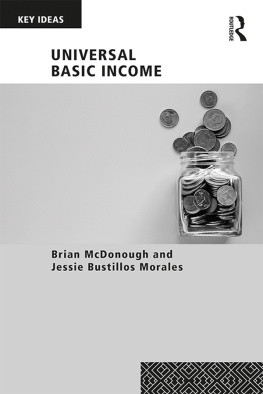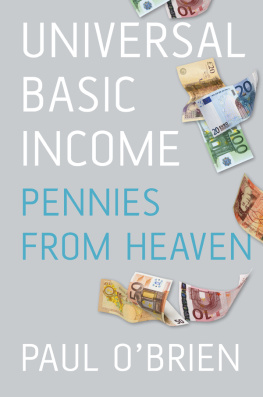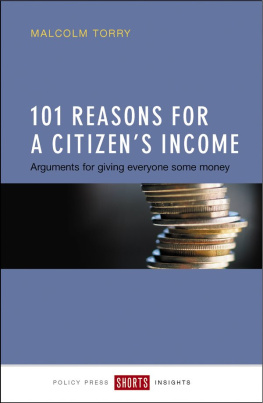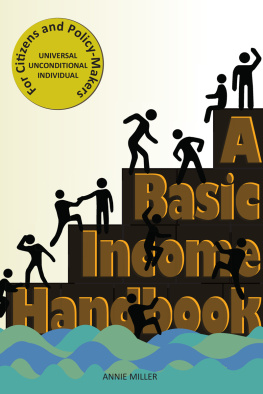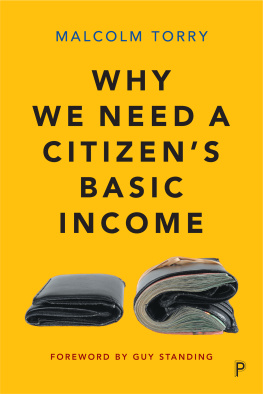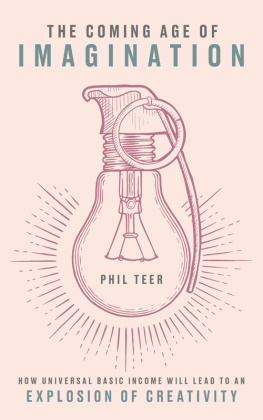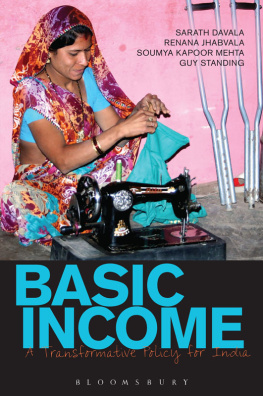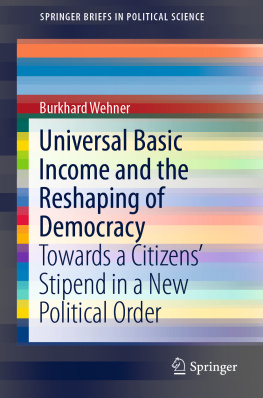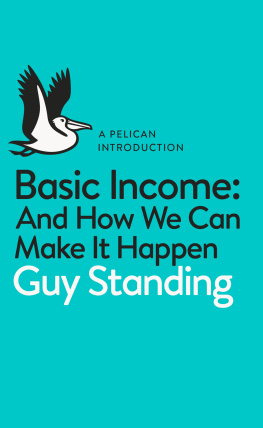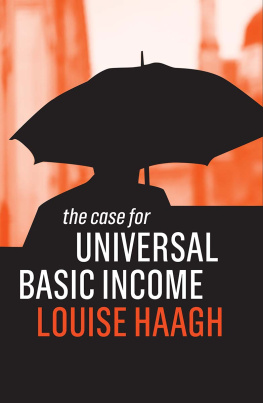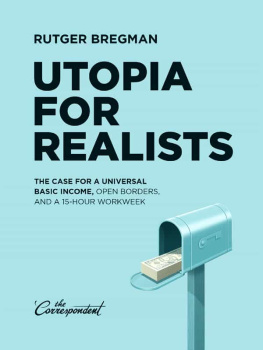UNIVERSAL BASIC INCOME
Universal basic income is a controversial policy which is causing a stir among academics, politicians, journalists and policy-makers all over the world. The idea of receiving money for nothing, with no strings attached, has for a long time appeared a crazy or radical proposal. But today, this policy is being put into practice. With more and more trials and experiments taking place in different countries, this book provides both the theory and context for making sense of different basic income approaches, examining how the policy can be best implemented. Unlike many other texts written on this topic, the book provides a balanced account of basic income, weighing up the pros and cons from a number of different positions. The book provides a theory chapter, enabling readers to grasp some of the complex philosophical ideas and concepts which underpin universal basic income, such as social justice, equality and freedom.It also provides an examples chapter, which examines both historical and contemporary basic income studies to have taken place from around the globe. The book also features chapters on the environment and the work of women, as well as an against universal basic income chapter, which specifically draws on the criticisms of the policy. This volume is an essential resource for anyone who wishes to get to grips with universal basic income.
Brian McDonough is Course Leader of Sociology at Solent University and teaches a number of sociological topics, including social inequalities and applied sociology in the community. His research interests include work, expertise and the use of information and communication technologies in the workplace. He is a co-author of Social Problems in the UK (2015) and has written on precarious work and unemployment in Europe.
Jessie Bustillos Morales is Senior Lecturer and Course Leader of Education and Social Policy at London Metropolitan University. She teaches at undergraduate and postgraduate level, looking at intersections between theory, economics and educational policy. She is co-editor of Economics in Education, published by Routledge, and has written on social problems in Europe. Her research interests also include explorations of gender, new media and youth cultures.
KEY IDEAS
Designed to complement the successful Key Sociologists, this series covers the main concepts, issues, debates, and controversies in sociology and the social sciences. The series aims to provide authoritative essays on central topics of social science, such as community, power, work, sexuality, inequality, benefits and ideology, class, family, etc. Books adopt a strong individual line, as critical essays rather than literature surveys, offering lively and original treatments of their subject matter. The books will be useful to students and teachers of sociology, political science, economics, psychology, philosophy, and geography.
Series editor: Peter Hamilton
Populism: An Introduction
Manuel Anselmi
Community third edition
Gerard Delanty
Welfare Conditionality
Beth Watts and Suzanne Fitzpatrick
The Stranger
Shaun Best
Secularization
Charles Turner
Universal Basic Income
Brian McDonough and Jessie Bustillos Morales
For a full list of titles in this series, please visit www.routledge.com/Key-Ideas/book-series/SE0058.
First published 2020
by Routledge
2 Park Square, Milton Park, Abingdon, Oxon OX14 4RN
and by Routledge
52 Vanderbilt Avenue, New York, NY 10017
Routledge is an imprint of the Taylor & Francis Group, an informa business
2020 Brian McDonough and Jessie Bustillos Morales
The right of Brian McDonough and Jessie Bustillos Morales to be identified as authors of this work has been asserted by them in accordance with sections 77 and 78 of the Copyright, Designs and Patents Act 1988.
All rights reserved. No part of this book may be reprinted or reproduced or utilized in any form or by any electronic, mechanical, or other means, now known or hereafter invented, including photocopying and recording, or in any information storage or retrieval system, without permission in writing from the publishers.
Trademark notice: Product or corporate names may be trademarks or registered trademarks, and are used only for identification and explanation without intent to infringe.
British Library Cataloguing-in-Publication Data
A catalogue record for this book is available from the British Library
Library of Congress Cataloging-in-Publication Data
Names: McDonough, Brian, 1982- author. | Bustillos Morales, Jessie, 1983- author.
Title: Universal basic income / Brian McDonough, Jessie Bustillos Morales.
Description: 1. Edition. | New York : Routledge, 2020. | Series: Key ideas | Includes bibliographical references and index.
Identifiers: LCCN 2019033738 (print) | LCCN 2019033739 (ebook)
Subjects: LCSH: Basic income. | Social justice. | Equality.
Classification: LCC HC79.I5 M353 2020 (print) | LCC HC79.I5 (ebook) | DDC 331.2/3--dc23
LC record available at https://lccn.loc.gov/2019033738
LC ebook record available at https://lccn.loc.gov/2019033739
ISBN: 978-1-138-47627-1 (hbk)
ISBN: 978-1-138-47630-1 (pbk)
ISBN: 978-1-351-10613-9 (ebk)
To Huxley George Bustillos McDonough
We would like to thank Dr Stuart Isaacs, from University of West London, for his continuous advice and support on the publication of this work. We would also like to thank a number of scholars who gave up their time to read and critique our various chapters, including Dr Philippa Velija and Dr Dave Webber at Solent University, and Professor Norman Ginsburg and Dr James Morgan at London Metropolitan University. We would also like to thank Beatriz Corrales Dominguez for her research around UBI criticisms.
Introduction
Imagine living in a society in which you are given money for nothing a monthly cash sum with no strings attached. Imagine a world in which, by virtue of being a citizen, youre provided with enough cash to keep you over and above the poverty line. This might sound like a radical idea, or utopian, but is exactly the kind of world which is discussed and examined in this textbook an idea which has been labelled (among other labels) a universal basic income. This idea is very controversial. For some, a universal basic income is a way forward, a way of achieving a more egalitarian world in which the lives of every citizen are looked after and cared for by the safety and economic security of the State. For others, a universal basic income is an extension of the nanny state; an absurd idea, which is both unrealistic and unaffordable. It may stifle economic growth, crash the economy and even bankrupt the state. Whatever ones opinion, nobody can dismiss the fact that the idea of a universal basic income has been gathering a lot of attention, and is currently a hot topic being discussed all over the globe. This popularity is not simply based on talk and debate, but is also based upon policy and practice, with countries such as Finland, Canada and India (among others) conducting basic income pilots and experiments. What is your opinion about universal basic income? Is it a crazy idea which will never work or a sensible solution to solving societys social issues and social problems? You may already have an opinion and want to express it in academic writing or public debate. Or your thoughts may be emerging from the reading of this text. Whatever your stance, reading this textbook will provide food for thought, allowing you to extend your thinking and develop your arguments for or against a universal basic income. This textbook is primarily designed for undergraduate students wishing to learn about universal basic income, providing a reliable source which can be used for academic writing and discussion. It introduces the ideas of universal basic income by providing an overview of its principles, examples and current debates.

